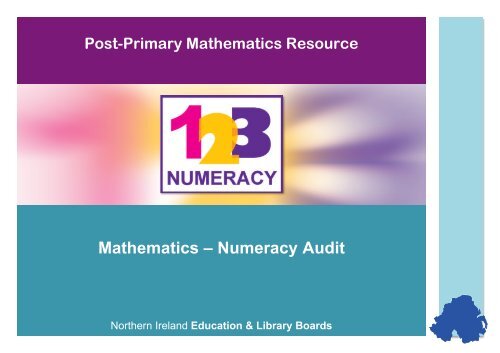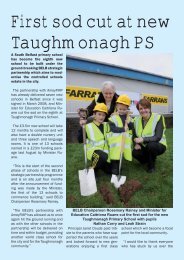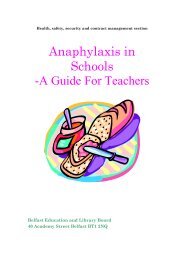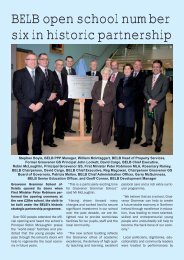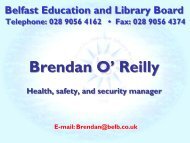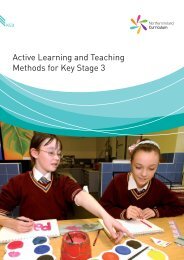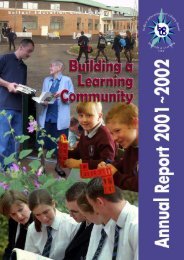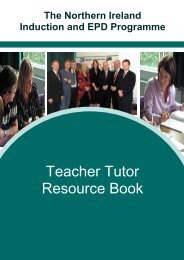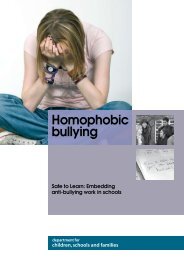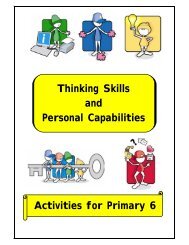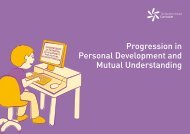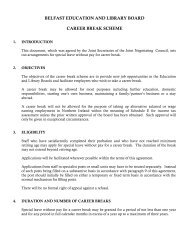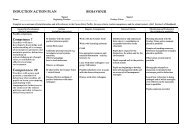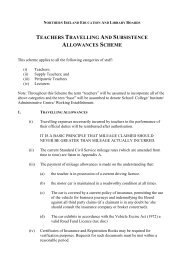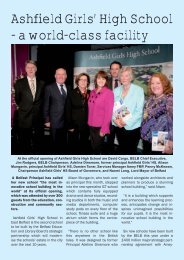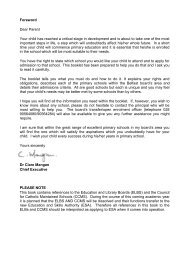Mathematics Numeracy Audit - Belfast Education & Library Board
Mathematics Numeracy Audit - Belfast Education & Library Board
Mathematics Numeracy Audit - Belfast Education & Library Board
Create successful ePaper yourself
Turn your PDF publications into a flip-book with our unique Google optimized e-Paper software.
<br />
Post-Primary <strong>Mathematics</strong> Resource<br />
<br />
<strong>Mathematics</strong> – <strong>Numeracy</strong> <strong>Audit</strong><br />
Northern Ireland <strong>Education</strong> & <strong>Library</strong> <strong>Board</strong>s
Post-Primary <strong>Mathematics</strong> Resource<br />
<strong>Mathematics</strong> – <strong>Numeracy</strong> <strong>Audit</strong><br />
This audit is recommended for use in the following circumstances:<br />
1. Schools in the Formal Intervention process<br />
2. Schools identified as ‘Closing the Gap’ schools<br />
3. School addressing post-inspection issue(s) in mathematics-numeracy<br />
4. Schools in the process of reviewing their 3-year School Development Plan<br />
5. Schools where the Head of <strong>Mathematics</strong> has been recently appointed<br />
At all times the use of audit should align with the areas for development prioritised in the current School Development Plan.<br />
The audit has been designed so that a school may focus on a particular section or part thereof.<br />
Section<br />
Page<br />
A Planning 3<br />
B Teaching & Learning 5<br />
C Assessment 8<br />
D Leadership and Management 10<br />
Northern Ireland <strong>Education</strong> & <strong>Library</strong> <strong>Board</strong>s<br />
2
Post-Primary <strong>Mathematics</strong> Resource<br />
Section A: PLANNING FOR MATHEMATICS<br />
This section of the document is intended to audit the effectiveness of the planning process.<br />
‘In just over two-fifths of departments, the scheme of work provided insufficient guidance to enable the teachers to plan effectively for<br />
learning and teaching. In particular, in over one-half of the departments, there was lack of sufficient detail on mathematical processes,<br />
ICT, mental mathematics and, importantly, how the provision could be differentiated to match the needs of the pupils.’ Follow-up to<br />
Better <strong>Mathematics</strong> October 2010 2.2 ii<br />
‘While there has been an improvement in addressing AFI 1, there remains a need to improve the quality of the scheme of<br />
work, not only by having them outline greater detail relating, in particular, to how the provision can be differentiated to meet<br />
the needs of all the pupils, but also by treating them as working documents that serve as a depository of best practice.’<br />
Follow-up to Better <strong>Mathematics</strong> October 2010 2.3<br />
PLANNING FOR MATHEMATICS Seldom Sometimes Often Always Evidence<br />
All teachers use the agreed scheme of work when<br />
planning for learning and teaching<br />
The year 8 Scheme of Work (SoW) takes into account<br />
the skills and understanding achieved by the pupils in<br />
year 7 of their primary schools<br />
The SoW complements the GCSE and GCE<br />
specifications<br />
Opportunities are provided for teachers to plan<br />
collaboratively<br />
The SoW clearly identifies the following:<br />
• learning intentions<br />
3<br />
Northern Ireland <strong>Education</strong> & <strong>Library</strong> <strong>Board</strong>s
Post-Primary <strong>Mathematics</strong> Resource<br />
• mathematical processes<br />
• ICT<br />
• mental maths<br />
• how provision can be differentiated to<br />
match pupil needs<br />
• communication<br />
• thinking skill and personal capabilities (TS<br />
&PC)<br />
• resources<br />
• assessment opportunities.<br />
Where additional mathematics support is available<br />
planning and communication takes place between the<br />
HoD, SENCO and class teacher.<br />
The scheme of work is a working document which is<br />
reviewed regularly and used to inform future planning.<br />
Further action:<br />
Northern Ireland <strong>Education</strong> & <strong>Library</strong> <strong>Board</strong>s<br />
4
Post-Primary <strong>Mathematics</strong> Resource<br />
Section B: TEACHING AND LEARNING<br />
This section of the document is intended to audit how effective the teaching is in promoting successful learning.<br />
‘Over the four years, there has been an improvement in the effectiveness of the teaching. The proportion of departments in which the<br />
overall effectiveness of teaching was evaluated as inadequate dropped to less than one-in-twenty in the most recent two-year period.<br />
However, in the same two-year period, there were still three-tenths of departments in which the overall effectiveness of the teaching<br />
was satisfactory, making one-third in total not good enough.’ Follow-up to Better <strong>Mathematics</strong> October 2010 3.1<br />
‘Although there has been improvement in addressing AFI2, there is still a need to improve the quality of teaching through using<br />
appropriate AfL strategies and making the pupils more actively engaged in their learning, including being given the time to discuss<br />
their work with peers and reflect on their own thinking.’ Follow-up to Better <strong>Mathematics</strong> October 2010 3.3<br />
TEACHING AND LEARNING Seldom Sometimes Often Always Evidence<br />
Teachers provide a supportive classroom<br />
environment which is conducive to mathematical<br />
learning.<br />
Classroom and corridor displays provide a<br />
stimulating mathematical environment promoting<br />
Careers and the STEM agenda.<br />
Teachers share learning intentions with their<br />
pupils (AfL)<br />
Lessons provide sufficient pace and challenge to<br />
motivate and engage all pupils.<br />
Teachers take account of pupils’ prior learning<br />
and diverse needs.<br />
5<br />
Northern Ireland <strong>Education</strong> & <strong>Library</strong> <strong>Board</strong>s
Post-Primary <strong>Mathematics</strong> Resource<br />
TEACHING AND LEARNING Seldom Sometimes Often Always Evidence<br />
Teachers use a range of learning and teaching<br />
strategies which are active and practical where<br />
appropriate.<br />
Teachers use effective questioning to enhance<br />
pupil learning<br />
Teachers make effective use of routine and<br />
incidental opportunities to promote mental<br />
maths.<br />
Teachers provide opportunities for pupils to think<br />
creatively take risks for learning and become<br />
increasingly independent learners.<br />
Learning opportunities support the development<br />
of the Cross-curricular Skills:<br />
• Communication<br />
• Using ICT<br />
• Using <strong>Mathematics</strong><br />
6<br />
Northern Ireland <strong>Education</strong> & <strong>Library</strong> <strong>Board</strong>s
Post-Primary <strong>Mathematics</strong> Resource<br />
TEACHING AND LEARNING Seldom Sometimes Often Always Evidence<br />
Learning opportunities support the development<br />
of the Thinking Skills and Personal Capabilities:<br />
Plenary sessions are used to review and<br />
consolidate the learning.<br />
Further action:<br />
7<br />
Northern Ireland <strong>Education</strong> & <strong>Library</strong> <strong>Board</strong>s
Post-Primary <strong>Mathematics</strong> Resource<br />
Section C: ASSESSMENT<br />
This section of the document is intended to audit how effective the assessment for and of learning is in supporting the school improvement<br />
agenda.<br />
‘During the 2008-10 academic years, however, the teachers’ use of appropriate AfL strategies was an AFI in nearly two-thirds of the<br />
departments visited.’<br />
Follow-up to Better <strong>Mathematics</strong> October 2010 3.2 vii<br />
ASSESSMENT Seldom Sometimes Often Always Evidence<br />
An appropriate range of assessment<br />
strategies (AfL) are used in all classrooms.<br />
There is a consistent approach to the<br />
marking, recording and reporting of<br />
achievements in mathematics.<br />
Formative feedback is used to support the<br />
learning process.<br />
Opportunities are provided for teachers to<br />
discuss and review pupil assessment<br />
information.<br />
Pupils are given opportunities to evaluate<br />
their own and one another’s work<br />
Pupils are given opportunities to evaluate<br />
their learning experiences<br />
8<br />
Northern Ireland <strong>Education</strong> & <strong>Library</strong> <strong>Board</strong>s
Post-Primary <strong>Mathematics</strong> Resource<br />
ASSESSMENT Seldom Sometimes Often Always Evidence<br />
Standardised tests are used to support the<br />
setting of targets and tracking of individual<br />
pupil attainment<br />
Assessment outcomes are used to inform<br />
future planning.<br />
Further action:<br />
9<br />
Northern Ireland <strong>Education</strong> & <strong>Library</strong> <strong>Board</strong>s
Post-Primary <strong>Mathematics</strong> Resource<br />
Section D: LEADERSHIP AND MANAGEMENT<br />
This section of the document is intended to audit the implementation of the school improvement cycle as applied to mathematics-numeracy.<br />
‘Over the four years ,there has been little improvement in the effectiveness of the monitoring and evaluation (including selfevaluation)and<br />
the degree to which it is leading to improvement: over two-fifths of the departments visited in the 2008-10 period<br />
demonstrated inadequate or unsatisfactory monitoring and evaluation leading to improvement.’ Follow-up to Better <strong>Mathematics</strong><br />
October 2010 4.1<br />
LEADERSHIP AND MANAGEMENT Seldom Sometimes Often Always Evidence<br />
Pupil outcomes are regularly analysed and<br />
reviewed to ensure appropriate matching of<br />
pupil ability to examination entry level.<br />
Planning for mathematics-numeracy is based<br />
on evidence from internal audit/review and/or<br />
external inspection.<br />
The departmental action plan is drawn up<br />
collaboratively and progress monitored at<br />
departmental meetings<br />
All teachers who teach maths attend<br />
departmental meetings<br />
The quality of teaching and learning is on the<br />
agenda for departmental meetings<br />
Departmental meetings are used to agree and<br />
share best practice<br />
10<br />
Northern Ireland <strong>Education</strong> & <strong>Library</strong> <strong>Board</strong>s
Post-Primary <strong>Mathematics</strong> Resource<br />
Teachers of mathematics are supported in the<br />
self-evaluation process – individually and<br />
departmentally<br />
Changes to bring about improvement are<br />
introduced as an outcome of the review and<br />
evaluation process.<br />
Further action:<br />
Northern Ireland <strong>Education</strong> & <strong>Library</strong> <strong>Board</strong>s<br />
11


